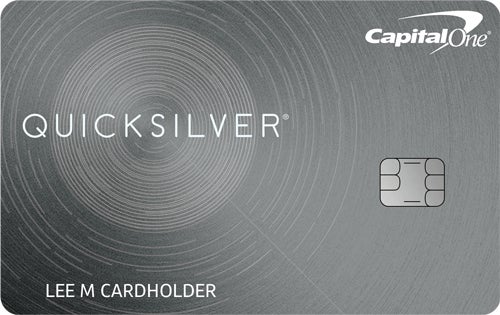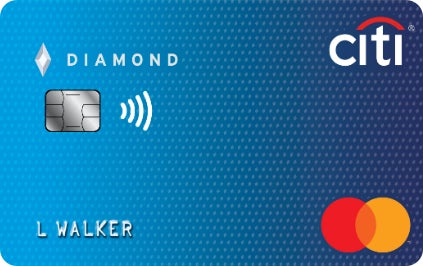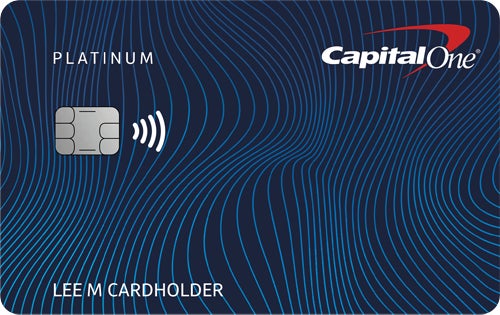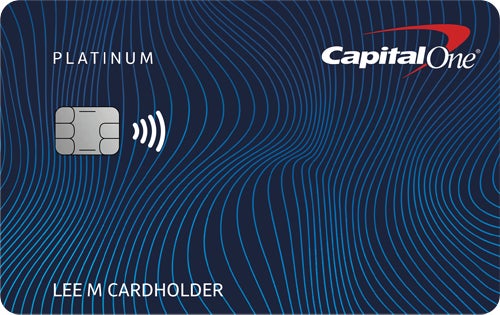| Credit Building Rating: | 4.2 / 5 |
| Cost of Membership | 5.0 |
| Ease of Building Credit | 2.5 |
| APR | 2.0 |
| Features | 3.8 |
In a Nutshell:
The Capital One Platinum Secured Credit Card makes credit building a breeze with a low stakes collateral investment that allows cardholders to build credit with minimal commitment.
Average cost of membership per year ($3,600 annual spend) |  |
Security deposit required |  |
Initial credit limit |  |
Access to higher credit line? |  |
APR |  |
Annual fee |  |
Other rates and fees
|  |
Rewards |  |
Other Notable Features: $0 fraud liability for unauthorized charges, emergency card services, tap to pay
The Capital One Platinum Secured card is an ideal credit-building card for users who want to put a minimal amount up as collateral to open a line of credit. That said, the Capital One Platinum Secured card lacks a rewards program and is limited by a credit maximum of $1,000, which is relatively low compared to other secured cards.
Why you might want the Capital One Platinum Secured Card
When you’re trying to build your credit – or even rebuild it after a money misstep or two – the best credit cards and financial products are typically out of reach. However, the Capital One Platinum Secured Credit Card is a low-frills option for credit builders that offers an inexpensive way to raise your credit score and demonstrate responsible credit usage over time. That can open the door to unsecured cards with better terms and benefits.
Low security deposit required
The security deposit required for the Capital One Platinum Secured Credit Card ranges from $49 to $200. This is a much lower barrier to entry compared to some other secured credit cards, many of which ask applicants for at least $300 (or even more) in upfront collateral. The security deposit can be paid over time and is fully refundable if you close your account (provided your balance is paid in full) or if you graduate to an unsecured card with Capital One.
See related: How a secured credit card helped my score
Low cost of ownership
With no annual fee (See Rates and Fees), it costs virtually nothing to open a Platinum Secured Credit Card account – other than the initial security deposit, of course. And, provided you pay your balance in full and on time every month, you won’t be subject to additional interest, fees or penalties (more on that later).
Higher credit limit consideration
Cardholders can gain access to higher credit lines with responsible use by making their first six monthly payments on time. This is an important step toward exhibiting the kind of responsible credit use that could help you obtain an unsecured card – perhaps one with a rewards or cash back program.
Few fees and penalties
Most notably, the Capital One Platinum Secured Credit Card comes with a balance transfer fee of $0 at the transfer APR, 4% of the amount of each transferred balance that posts to your account at a promotional APR Capital One may offer to you and no foreign transaction fees (See Rates and Fees). In addition, Capital One won’t hike up your APR if you pay your bill late, nor will it charge you a fee for returned payments (See Rates and Fees).
Its other fees and penalties, however, are fairly standard when it comes to secured cards. Besides the aforementioned APR – which could quickly drive up your overall balance if you fail to pay off your card in full every month – making a late payment will cost you up to $40, whereas taking a cash advance will subject you to a fee of 5% (but not less than $5). Save yourself the extra cash by keeping current on all payments and avoiding cash advances (See Rates and Fees).
Capital One Platinum Secured Credit Card benefits
The Capital One Platinum Secured Credit Card comes with standard benefits for a card of its class, including $0 fraud liability for unauthorized charges should your card be lost or stolen, emergency card services (which gets you an emergency card replacement and, depending on your available credit, a cash advance) if you card is lost or stolen, and assistance should you become the victim of identity theft.
Why you might want a different secured credit card
The Capital One Platinum Secured Card might not be the best fit for you if you don’t reliably make payments on time or are looking for a card with a higher maximum credit limit. Because Capital One only lets cardholders put down at most $1,000 to open a card account, this can really put you in a position to use a high amount of your available credit – which may position you to hurt your credit score rather than build it up. Other options, like the Citi® Secured Mastercard®, could come with a lower variable APR and a higher credit maximum.
High APR
Like most secured credit cards, the Capital One Platinum Secured Credit Card comes with a relatively hefty APR of 29.99% (Variable) (See Rates and Fees). Pay your bill in full each month, however, and you won’t be impacted by this rate. Maintaining your account in good standing may also position you to qualify for an unsecured card more quickly.
Relatively low maximum credit limit
So long as you make the minimum required security deposit, which could be as low as $49, you’re guaranteed an initial credit line of $200. You can choose a higher credit line by depositing more money prior to your account opening, but your credit line will only increase by the value of said deposit, up to a maximum line of $1,000. This is low compared to some other secured options and – depending on your spending habits – gives you very little wiggle room to use your credit efficiently and keep your credit utilization low.
See related: Best high limit secured credit cards
Lack of a rewards program
Unfortunately, the Capital One Platinum Secured card has no rewards program to benefit cardholders. This is par for the course when it comes to most secured cards, but there are other options in this category that do offer valuable rewards, such as the Discover it® Secured Credit Card’s 2% cash back at restaurants and gas stations (on up to $1,000 in combined purchases each quarter) and 1% cash back on other purchases. More closely related is the Capital One Quicksilver Secured Cash Rewards card, which earns 1.5% back on all eligible purchases.
Tight approval odds
To qualify for the Capital One Platinum Secured card, your monthly income must exceed your monthly rent or mortgage payment by at least $425, otherwise Capital One considers you unable to make your regular credit card payments. A non-discharged bankruptcy could also cause you to be declined.
Although no secured credit card offers guaranteed approval, you’ve got a pretty good chance of qualifying for the Platinum Secured thanks to its required security deposit if you meet the above qualifications. Even if you’ve defaulted on another loan or credit card in the past – or have been turned down for credit recently – you’re still eligible to apply and will likely be approved.
How does the Capital One Platinum Secured Credit Card compare to other secured cards?
The Capital One Platinum Secured card is ideal for potential cardholders who prefer to put down a small security deposit and who want to avoid additional fees like foreign transaction fees (See Rates and Fees). However, it does come with a high APR and lacks a rewards program, which you can find on other secured cards.
 |  |  |
|---|---|---|
Security deposit required
| Security deposit required
| Security deposit required
|
Rewards rate
| Rewards rate
| Rewards rate
|
| Annual fee $0 (See Rates and Fees) | Annual fee $0 | Annual fee $0 (See Rates and Fees) |
Access to higher credit line?
| Access to higher credit line?
| Access to higher credit line?
|
Capital One Platinum Secured Credit Card vs. Capital One Quicksilver Secured Cash Rewards Credit Card
Another offer from Capital One, the Quicksilver Secured Cash Rewards Credit Card, has a higher security deposit requirement but also comes with a 1.5% flat-rate cash back rewards benefit on all eligible purchases. This is a generous offer on a secured card and compares well to even unsecured cash back cards. If you’re looking to open a secured card with a low deposit, the Platinum Secured card is still your best option. If you have the capital to commit as collateral, a minimum of $200 can get you started on the Quicksilver Secured Cash Rewards Card and you’ll start to earn rewards on eligible purchases. Like the Platinum Secured, the Quicksilver Secured also qualifies you to access a higher credit limit after six months of on-time payments
For instance, with a $200 credit limit on the Quicksilver Secured Cash Rewards card you’ll have an annual credit limit of $2,400. If you spend exactly that amount each year, you’ll earn $36 back in cash rewards.
Capital One Platinum Secured Credit Card vs. Citi® Secured Mastercard®
The Citi Secured Mastercard is a great alternative to the Capital One Platinum Secured Credit Card if you want a card with a slightly lower APR and the ability to graduate to an unsecured card down the line. Citi offers cardholders the ability to upgrade to an unsecured card after 18 months of on-time payments, making this card a great option for cardholders looking to streamline their credit journey and jump right into an unsecured card once they meet Citi’s expectations. Although you’ll have a low starting credit line on the unsecured card when you get there after 18 months, you’ll free up your security deposit.
While the Citi Secured Mastercard’s APR is lower than the Platinum Secured card’s, these rates are still not something you want to have to deal with. A credit management best practice is to consistently make on-time payments, which allows you to avoid accruing interest and remain in good standing with your issuer. In this case, on-time payments means the difference between staying on a secured card or graduating to an unsecured card, which can be a substantial step in one’s financial journey.
Capital One Platinum Secured Credit Card vs. Capital One Platinum Credit Card
Although not a secured card, another Capital One credit-building option is the Capital One Platinum Credit Card, a no-annual-fee (See Rates and Fees) card geared toward consumers with average credit or better (a FICO score of 580 or higher).
Unlike the Capital One Platinum Secured Credit Card, the Capital One Platinum is an unsecured credit card, so it doesn’t require you to put down a security deposit. This could be a big advantage if you’re short on cash or don’t want to tie up money in a deposit while you work on your credit. On the other hand, since it’s an unsecured card, the Capital One Platinum will likely start you out with a very small credit limit, which could make it more difficult to maintain low credit utilization. You can use tools like our credit utilization calculator to check and make sure you’re maintaining a low ratio.
While both cards can help you build your credit with responsible use, the best choice for you will depend on your financial situation and habits. Here’s a side-by-side comparison to help you decide.
| Card | Card type | Credit limit | Annual fee |
| Capital One Platinum Secured Credit Card | Secured. Some users report success in graduating to an unsecured card. | $200-$1,000 (depending on your deposit) | $0 (See Rates and Fees) |
| Capital One Platinum Credit Card | Unsecured. No deposit is required. | See terms | $0 (See Rates and Fees) |
How to use the Capital One Platinum Secured Credit Card:
- Make all payments on time to avoid incurring penalty fees (not to mention a hit to your credit report). Consider signing up for autopay so you don’t forget. Making timely payments is one of the best ways to establish a healthy credit history.
- Consider increasing your initial credit line by making a higher-than-required security deposit. Doing so can help improve your credit utilization ratio, another major factor in your overall credit score.
- Avoid taking cash advances, the fees for which can quickly increase your total amount owed.
- Pay your regular balance in full every month to avoid accruing higher-than-average interest charges. Additionally, carrying a balance can make it more difficult to demonstrate your reliability to card issuers.
Is the Capital One Platinum Secured Card right for you?
It’s important to determine where you are in your credit journey. If you have credit history and a fair score, you might want the convenience of a credit card without having to put down money as collateral. In this instance, an unsecured card like the Capital One Platinum Card is your best option (if you have a FICO score of at least 580). However, not everyone has credit or has, in the past, used credit irresponsibly and may not be approved for unsecured cards.
If you want to rebuild your credit or just get started, the Capital One Platinum Secured Credit Card lets you do so with a low collateral investment and provides you the opportunity to establish yourself as a responsible borrower with little risk involved.
*All information about the Citi Secured Mastercard has been collected independently by CreditCards.com and has not been reviewed by the issuer.
For Capital One products listed on this page, some of the above benefits are provided by Visa® or Mastercard® and may vary by product. See the respective Guide to Benefits for details, as terms and exclusions apply.
All reviews are prepared by CreditCards.com staff. Opinions expressed therein are solely those of the reviewer and have not been reviewed or approved by any advertiser. The information, including card rates and fees, presented in the review is accurate as of the date of the review. Check the data at the top of this page and the bank’s website for the most current information.
Responses to comments in the discussion section below are not provided, reviewed, approved, endorsed or commissioned by our financial partners. It is not our partner’s responsibility to ensure all posts or questions are answered.
Partner Offer: carefully review product terms on Capital One's site before applying
